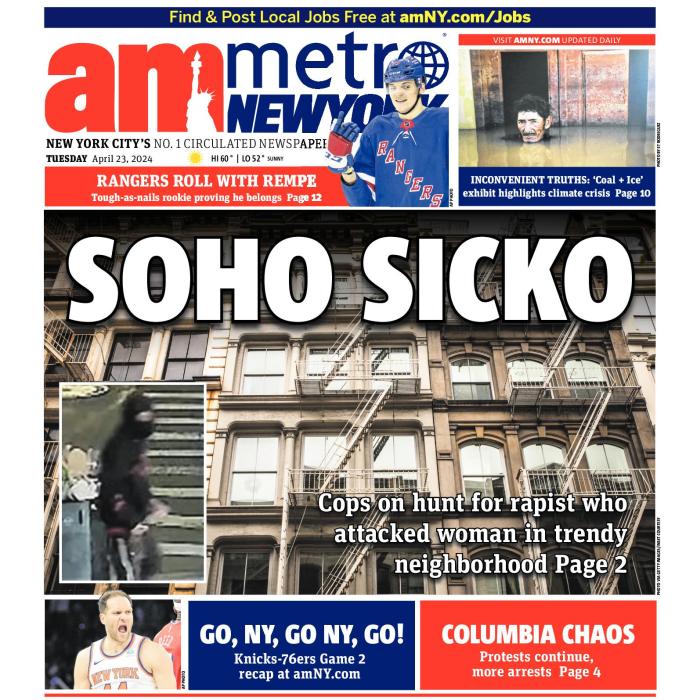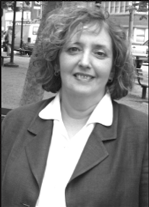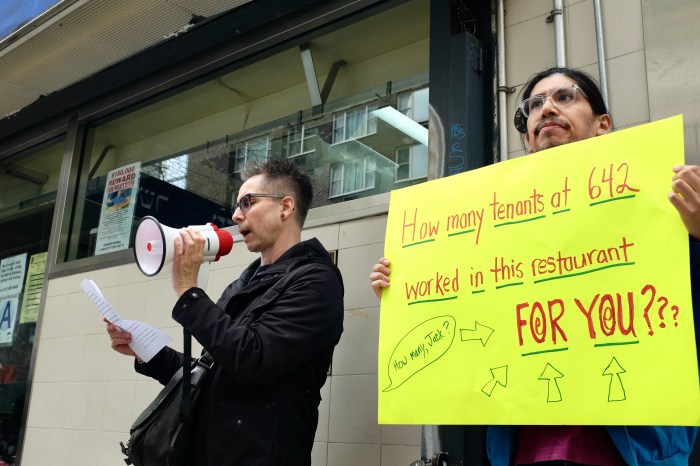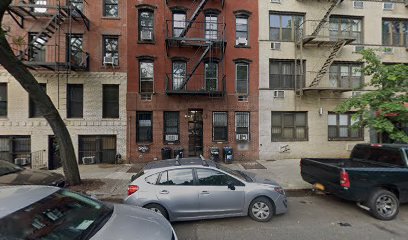By Josh Rogers
She doesn’t yet have a staff, a budget, an organizational bank account or even an office, but Ellen Baer started earlier this month as the first president of the Hudson Square Business Improvement District.
Baer took her first meeting in The Villager’s Hudson Square office for an interview with editors and reporters last Wednesday, the same day the BID’s board of directors approved her hiring.
Baer, 54, was a partner at Hamilton, Rabinovitz and Alschuler, Inc., a large economic-development consultant firm that worked on the High Line park and advised the Pier 40 Partnership on its community-backed redevelopment proposal for Pier 40 at W. Houston St.
The new BID will concentrate on marketing the neighborhood, which is located just west of Soho, and improving the quality of life, but will not take on other traditional BID duties, such as street cleaning and security. The district’s $1.7 million budget comes from property owners, who pay a fee of about 19 cents per square foot.
The former Printing District’s population is less than 1,000, some of whom live in buildings not zoned for residents. In recent years, media companies, architectural firms and other new business tenants have helped create what Baer calls a “creative vibe.”
“I love the whole feel of it,” she said. “There’s a real vibe in this neighborhood.”
She said distinguishing the area from Soho will come with time.
“Hudson Square has its own — or will someday I think have its own — known identity, too,” she said. “Hudson Square needs to evolve as a place.”
There is no consensus on the neighborhood’s boundaries — some actually deny its existence. But for the acceptors, Hudson Square’s rough boundaries are Sixth Ave., Canal St., Houston St. and the Hudson River. Trinity Real Estate, the district’s largest property owner and the BID’s sponsor, tried unsuccessfully to create a BID six years ago. Trinity reduced the district size this time to exclude more-residential areas, including the area west of Greenwich St. Community Board 2 opposed the original application, but supported it last year without any opposition.
Baer is beginning to make the rounds to find out what people need and want.
“My job is to pull together a vision, not create one out of the head of Ellen Baer,” she said. “My first job is to get out talking to people.”
She said some pedestrian crossings are not safe, and she’s already put the Port Authority on notice that she wants to discuss ways to improve conditions around the Holland Tunnel; she said the city and perhaps the state will also be part of the conversations.
Tobi Bergman, a Hudson Square dweller and C.B. 2’s nonvoting representative to the BID, agreed traffic is the neighborhood’s biggest problem, particularly since it is mostly drivers who are just trying to pass through to other places.
“It’s kind of a dead-zone type of traffic — it gets there and it doesn’t move,” he said in a phone interview.
Streets like Varick, Spring, Broome and Watts need more lanes for neighborhood traffic and fewer for the tunnel, Bergman said, pointing out that the federal government has been funding studies of Canal St. traffic for many years, developing plans that could be implemented quickly.
That’s just the type of job Baer says she can do well.
“I’m about taking plans from paper to implementation,” she said.
Laura Walker, the BID’s chairperson, said Baer’s résumé is right for the job.
“She has a lot of experience, not just in the public and private sector, but also in the intersection of the two, which is what a BID is all about,” said Walker, who is C.E.O. of WNYC, New York Public Radio, which moved into the neighborhood last year.
Baer, whose master’s thesis was on public-private partnerships, worked for many years in city government, including at the Parks Department and the Economic Development Corporation’s predecessor, the Public Development Corporation.
In 1993, Baer, who was then chief of staff to Deputy Mayor Norman Steisel, was accused of soliciting a job from Lockheed Information Management Services while the firm was bidding on a contract to collect New York City parking fines. Baer, who had withdrawn from the contract decision, according to a 1995 Daily News article, later left city government and agreed to pay a $5,000 fine.
Without going into specifics last week, Baer said she learned from the episode.
“It was in the past, and like all difficult life experiences, I just try to take the positive out of it and leave the negative behind,” she said.
Baer, a lifelong New Yorker, said her connection to the city grew stronger after 9/11. She married David Lebenstein, a real estate executive, four years ago and she has two grown stepchildren. The couple live on the Upper West Side. Baer grew up in Stuyvesant Town/Peter Cooper Village, attending P.S. 40 and Friends Seminary in the Gramercy neighborhood. She also used to live in the West Village Houses.
For now, she’s focused on preparing for July 1, when the BID begins full operations. Her salary is $150,000, and she expects to hire three or four people.
The neighborhood’s building owners hired her, so Baer is not too worried about finding an office, saying, “There are lots of good landlords in the district.”


















